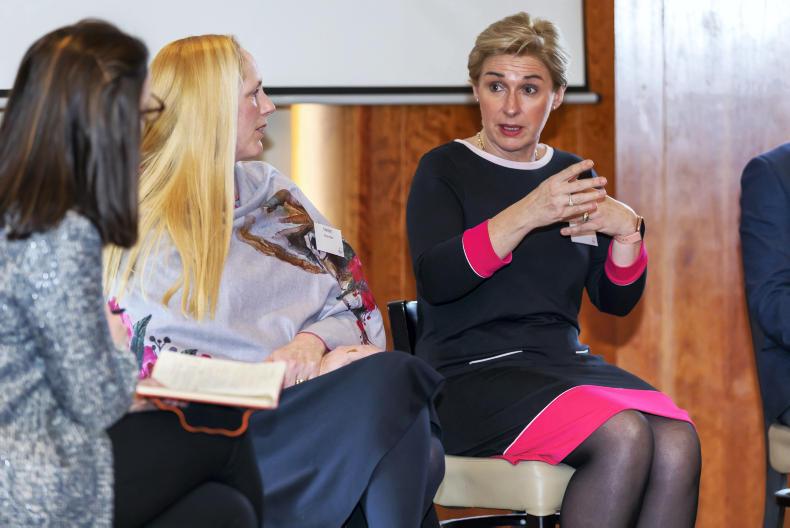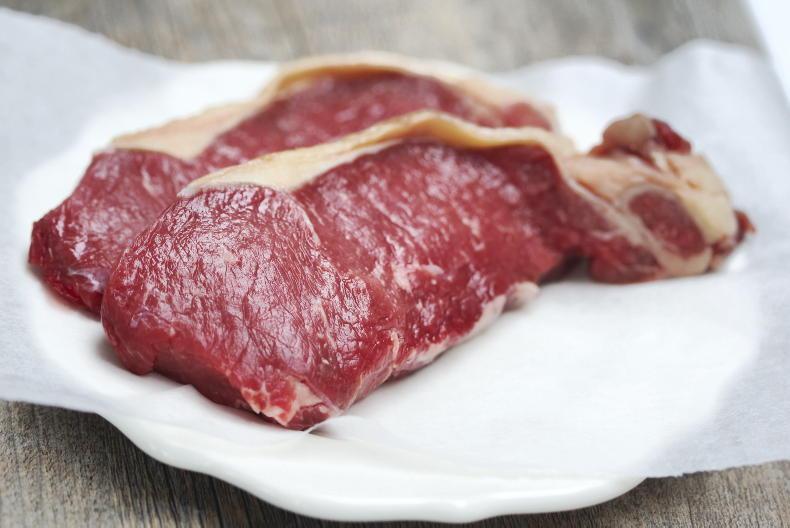At Tuesday's Agricultural Science Association (ASA) ‘meat myth busters’ event, Dr Sinead McCarthy from Teagasc Ashtown Research Centre spoke on myths surrounding food, health and climate.
Dr McCarthy’s research has focused on consumer behaviour in relation to food and health and she is currently working in the area of food consumption, health and sustainability.
Environmental impact
In terms of the environmental impact, she expressed concern that there was a growing assumption that plant-based diets are beneficial for both health and the environment, when, in fact, sustainable diets that are optimised for both are far more complicated.

Dr Helen Sheridan, UCD; Dr Sinead McCarthy, Teagasc; Dr Tommy Boland, UCD; and Phelim O’Neill, Irish Farmers Journal; at the Agricultural Science Association (ASA) meat myth busters event at Killashee House Hotel.
Outlining the need for sustainable consumption and production of food while getting the correct balance for health, she said: “We could end up with poor health by just choosing low-carbon footprint foods.
We don’t just eat meat
"We don’t just eat meat. Diets are composed of individual foods that are combined to form dietary patterns.
"If there is a trade-off of one food for another, which is not as nutritionally complete, this can make adhering to certain nutritional requirements more difficult.”
Sustainability versus health credentials
From a nutritional point of view, she outlined that many foods which are low in emissions are energy-dense and have a poor nutritional profile.
Therefore, diets beneficial for the environment could lead to reduced nutrient intakes.
“For example, if you want to go for a low-carbon-footprint lunch, you can opt for chocolate (3kg CO2 per kg), pizza (5kg CO2 per kg) and cola (2 kgCO2 per kg) over cheese (9kg CO2 per kg), mince bolognese (13kg CO2 per kg) and milk (2 kgCO2 per kg), but this would not be good from a health perspective."
How sustainable is the Irish diet?
Dr McCarthy is currently involved with research looking at the Irish diet from a greenhouse gas emission perspective.
Teagasc is using a life cycle analysis (LCA) approach to this work, which considers production right through to consumer waste.
According to McCarthy, one approach that Irish people can take to reduce their own carbon footprint is simply eating to their own dietary requirements - that is, eating a balanced diet not to excess.
“If a person takes in excess energy through excessive eating, they produce excess carbon out, which also contributes to excess body weight and the health issues that come with that.

Roberta McDonald, Devenish; Seamus O’Mahony, ASA president; Amii McKeever, Irish Farmers Journal; Phelim O’Neill, Irish Farmers Journal; Dr Helen Sheridan, UCD; Dr Tommy Boland, UCD; and Dr Sinead McCarthy, Teagasc; at the Agricultural Science Association (ASA) meat myth busters event at Killashee House Hotel.
“By virtue of the higher requirement that men have for calories, they also produce more CO2.
An Irish man eats 3.34kg food per day, producing 7.85kg CO2eq per day, while an Irish woman eats 2.67kg food per day producing 5.27kg CO2eq per day.
Eating beyond our estimated requirements is a form of food waste that contributes . . . to climate change
“Eating beyond our estimated requirements is a form of food waste that contributes not only to climate change, but also to public health issues such as obesity.
"Those consuming beyond their energy requirements generate 25% more emissions or an extra 1.5kg CO2 per day. "
A question posed as part of this work was ‘is a diet free of animal protein more sustainable?'
The Teagasc scientist’s analysis was that a sustainable diet that meets dietary requirements for health with lower emissions can be achieved without eliminating meat or dairy products.
She called out the need for a more holistic approach to reducing dietary emissions rather than focusing solely on lowering meat consumption.
At Tuesday's Agricultural Science Association (ASA) ‘meat myth busters’ event, Dr Sinead McCarthy from Teagasc Ashtown Research Centre spoke on myths surrounding food, health and climate.
Dr McCarthy’s research has focused on consumer behaviour in relation to food and health and she is currently working in the area of food consumption, health and sustainability.
Environmental impact
In terms of the environmental impact, she expressed concern that there was a growing assumption that plant-based diets are beneficial for both health and the environment, when, in fact, sustainable diets that are optimised for both are far more complicated.

Dr Helen Sheridan, UCD; Dr Sinead McCarthy, Teagasc; Dr Tommy Boland, UCD; and Phelim O’Neill, Irish Farmers Journal; at the Agricultural Science Association (ASA) meat myth busters event at Killashee House Hotel.
Outlining the need for sustainable consumption and production of food while getting the correct balance for health, she said: “We could end up with poor health by just choosing low-carbon footprint foods.
We don’t just eat meat
"We don’t just eat meat. Diets are composed of individual foods that are combined to form dietary patterns.
"If there is a trade-off of one food for another, which is not as nutritionally complete, this can make adhering to certain nutritional requirements more difficult.”
Sustainability versus health credentials
From a nutritional point of view, she outlined that many foods which are low in emissions are energy-dense and have a poor nutritional profile.
Therefore, diets beneficial for the environment could lead to reduced nutrient intakes.
“For example, if you want to go for a low-carbon-footprint lunch, you can opt for chocolate (3kg CO2 per kg), pizza (5kg CO2 per kg) and cola (2 kgCO2 per kg) over cheese (9kg CO2 per kg), mince bolognese (13kg CO2 per kg) and milk (2 kgCO2 per kg), but this would not be good from a health perspective."
How sustainable is the Irish diet?
Dr McCarthy is currently involved with research looking at the Irish diet from a greenhouse gas emission perspective.
Teagasc is using a life cycle analysis (LCA) approach to this work, which considers production right through to consumer waste.
According to McCarthy, one approach that Irish people can take to reduce their own carbon footprint is simply eating to their own dietary requirements - that is, eating a balanced diet not to excess.
“If a person takes in excess energy through excessive eating, they produce excess carbon out, which also contributes to excess body weight and the health issues that come with that.

Roberta McDonald, Devenish; Seamus O’Mahony, ASA president; Amii McKeever, Irish Farmers Journal; Phelim O’Neill, Irish Farmers Journal; Dr Helen Sheridan, UCD; Dr Tommy Boland, UCD; and Dr Sinead McCarthy, Teagasc; at the Agricultural Science Association (ASA) meat myth busters event at Killashee House Hotel.
“By virtue of the higher requirement that men have for calories, they also produce more CO2.
An Irish man eats 3.34kg food per day, producing 7.85kg CO2eq per day, while an Irish woman eats 2.67kg food per day producing 5.27kg CO2eq per day.
Eating beyond our estimated requirements is a form of food waste that contributes . . . to climate change
“Eating beyond our estimated requirements is a form of food waste that contributes not only to climate change, but also to public health issues such as obesity.
"Those consuming beyond their energy requirements generate 25% more emissions or an extra 1.5kg CO2 per day. "
A question posed as part of this work was ‘is a diet free of animal protein more sustainable?'
The Teagasc scientist’s analysis was that a sustainable diet that meets dietary requirements for health with lower emissions can be achieved without eliminating meat or dairy products.
She called out the need for a more holistic approach to reducing dietary emissions rather than focusing solely on lowering meat consumption.












SHARING OPTIONS